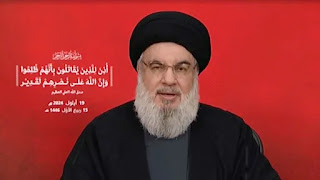Saturday, September 28, 2024
Israel killed Hezbollah leader Hassan Nasrallah in Beirut strike, group confirms
Hezbollah leader Sayyed Hassan Nasrallah gives a televised address on September 19, 2024, in this screenshot taken from a video. Al-Manar TV/Reuters
Tel Aviv and Beirut
CNN
—
The leader of the Lebanon Hezbollah, Hassan Nasrallah, was killed in an Israeli airstrike on his underground headquarters in Beirut on Friday, Israel and Hezbollah confirmed.
Nasrallah, who had led the powerful group for more than 30 years and was a hugely influential figure in the region, died when Israeli fighter jets struck in an area of the capital’s southern suburbs known as Dahiyeh.
The killing of Nasrallah marks a significant escalation in the conflict between Israel and Hezbollah, which has intensified in recent weeks, prompting fears that it could spill over into a regional war.
The Israel Defense Forces (IDF) said Nasrallah had been operating from the headquarters and “advancing terrorist activities against the citizens of the State of Israel.”
Hezbollah described Nasrallah as a “sacred martyr” and vowed to continue its fight against Israel. He was among several Hezbollah fighters – and a senior Iranian commander – killed in the strike on Friday.
“The leadership of Hezbollah pledges to the most supreme, sacred, and dearest martyr in our journey, filled with sacrifices and martyrs, that it will continue its fight to confront the enemy, in support of Gaza and Palestine, and in defense of Lebanon and its steadfast and honorable people,” the group said in a statement.
The Hezbollah-owned Al-Manar TV channel switched to Quranic recitations – an Islamic gesture declaring mourning. Hamas issued a statement mourning Nasrallah, as did other regional allies. The powerful Iraqi cleric Muqtada Al-Sadr announced three days of mourning in Iraq, referring to Nasrallah as a “companion in the path of resistance.”
A photo taken on September 18, 2024, in Beirut's southern suburbs shows the remains of exploded pagers on display at an undisclosed location. Hundreds of pagers used by Hezbollah members exploded across Lebanon on September 17, killing at least nine people and wounding around 2,800 in blasts the Iran-backed militant group blamed on Israel.
Related article
Israel concealed explosives inside batteries of pagers sold to Hezbollah, Lebanese officials say
Nasrallah turned Hezbollah into the most robustly armed non-state group in the region – commanding a dedicated following across Lebanon, Iraq, Syria and Yemen. It is the most dominant political force in crisis-ridden Lebanon. Much of the Western world has designated Hezbollah a terrorist organization.
Fears of an all-out war peaked earlier this month, after Israel unleashed a wave of lethal explosions of communications devices, targeting Hezbollah fighters in Lebanon. Some of those killed were civilian bystanders.
Then on Monday, Israel launched an intensive aerial campaign in southern and eastern Lebanon, in what was the deadliest day for the country in nearly two decades. Hezbollah has fired multiple rocket barrages into northern Israel in response to the attacks.
Israeli bombs in Lebanon have since killed at least 700 people, and thousands more have been injured, the UN’s Office for the Coordination of Humanitarian Affairs (OCHA) said on Friday.
Nearly 120,000 others have been displaced, according to OCHA, in a country where both Lebanese and refugees from other countries were already facing sharp poverty, economic instability and limited access to healthcare. Estimates in Lebanon suggest that number could be much higher.
An Israeli military official said they did not yet know how many civilians were killed in Israel’s strike on southern Beirut that killed Nasrallah.
Subscribe to:
Post Comments (Atom)
Israel killed Hezbollah leader Hassan Nasrallah in Beirut strike, group confirms
Hezbollah leader Sayyed Hassan Nasrallah gives a televised address on September 19, 2024, in this screenshot taken from a video. Al-Manar T...

-
Freelancing is a form of self-employment where individuals offer their skills and services to clients or businesses on a project-by-proje...
-
It's the southernmost post of exit from Gaza and borders Egypt's Sinai peninsula. There are only two other border crossings from an...
-
E-commerce, short for electronic commerce, refers to the buying and selling of goods and services over the internet. It has become a si...


No comments:
Post a Comment